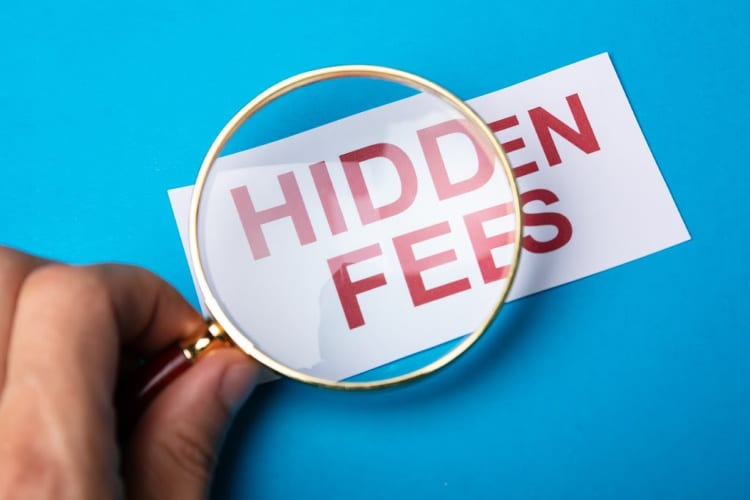(Psst: The FTC wants me to remind you that this website contains affiliate links. That means if you make a purchase from a link you click on, I might receive a small commission. This does not increase the price you’ll pay for that item nor does it decrease the awesomeness of the item. ~ Daisy)
By Dagny Taggart
How many times have you read the fine print on a bill and been shocked to find an unexpected fee listed?
Hidden fees are now so common that if you haven’t been slapped with one yet, you are in the minority.
Just over a year ago, Consumer Reports launched an ongoing campaign called What the Fee?! and the information they have gathered since launching the program is eye-opening. The nonprofit organization conducted a survey and found that at least 85 percent of Americans have encountered an unexpected or hidden fee over the past two years for a service they had used. And, two-thirds of the 2,000 surveyed said they are paying more now in surprise charges than they did five years ago.
People are getting really tired of paying so many fees.
Since CR launched their campaign, they have heard from “roughly 3,480 Americans” who are “angry about the growing number of fees showing up on their bills.” Here’s an excerpt from a recent report on their survey:
There’s the West Chester, Pa., woman irate over the $25 broadcast and sports fees she pays every month though she never watches sports—and about the $150 cancellation fee when she quit her provider.
Or the traveler in Texas who found that every time he went through a highway toll, the car-rental company dinged him $15 on top of the toll price, leading to an extra $90 in “administrative fees.” “They will charge $15 to process even a 31 cent toll charge,” he says. “Completely ridiculous!”
How about the music lover in Charlotte, N.C., shocked to find that after fees were added in, his concert ticket actually cost $123.18, not $99.95. Why can’t it be that “the price shown is the price paid?” he wanted to know. (source)
Companies are finding ways to trick us into paying more fees.
Extra charges are being added to more and more transactions these days, and are often hidden in the fine print or are combined with taxes or other costs. Sometimes they are buried within the fine print at the end of a contract or pop up when you reach the last page of an online transaction. Add-on fees can be difficult to spot, requiring customers to click through multiples pages on a website or to scrutinize fine print to locate the information. Economists call this gradual reveal strategy drip pricing. “Once people have spent time searching a price, they are less likely to start over when they see the fees,” Vicki Morwitz, a professor of marketing at the New York University Stern School of Business, told CR. “They often mistakenly assume competitors will have the same fees,” she explained.
Some of these fees are small and are barely noticeable unless you pay attention to the fine print. But, even those smaller charges add up over time and can put a significant dent in your savings.
According to Justia, undisclosed fees are a growing problem and are costing consumers millions of dollars every year. These hidden charges may appear in a variety of services, including (but not limited to) the following:
- Credit card fees included in a monthly statement;
- Bank fees deducted from a consumer’s account;
- Fees for use of a bank’s automated teller machine (ATM);
- “Inactivity” fees charged by a bank or credit card company;
- Hidden fees or surcharges by cellular telephone, cable, or internet service providers;
- Additional insurance fees or premiums;
- Hidden fees or charges by airlines, rental car companies, or hotels;
- Undisclosed fees by brokers or other financial professionals;
- Fees charged for subscription-based services; and
- Internet memberships and services.
All of these fees can add up and can contribute to financial difficulties.
While many of these fees are relatively small – between $10 and $20 – they add up and can pose a financial strain for many families, adding up to thousands in additional costs.
On a national level, data from a few industries alone show that add-on charges are siphoning billions of dollars from Americans’ wallets every year.
In the case of airlines, for example, the two main travel charges—reservation change fees and baggage fees—accounted for a combined $7.6 billion in revenue in 2018, up from $6.8 billion in 2015, according to the Bureau of Transportation Statistics.
For banks, overdraft fees are a growing source of revenue, with the largest banks pulling in $11.5 billion in overdraft charges in 2018, up from $11.2 billion in 2015, according to an analysis of Federal Deposit Insurance Corp. (FDIC) data by the Center for Responsible Lending, a nonprofit consumer financial advocacy group.
The hotel industry, meanwhile, raked in a record $2.9 billion in resort fees and other fees and surcharges in 2018, with even more expected for 2019, according to Bjorn Hanson, Ph.D., a hotel consultant and clinical adjunct professor at the Jonathan M. Tisch Center for Hospitality at New York University. (source)
Fees associated with traveling can be particularly high.
Speaking of traveling, according to a recent article on the site Money Crashers, there are 32 (yes, 32!) hidden fees to watch for when you are planning your next vacation. In that article, author Hope Nardini notes that “the travel industry is gradually adding fees on services that used to be complimentary” and provides information on how to avoid getting nickeled and dimed when you book your next trip. For even more on how to travel without breaking the bank, check out Cheapskates on Vacation: 10 Thrifty Tips for Your Summer Travel Budget.
One possible reason for increases in hidden fees associated with travel may be the popularity of online shopping websites like Expedia and Hotels.com, which allow consumers to compare prices from multiple sellers to find the cheapest options, according to CR:
That stepped-up price competition has helped to lower prices for many goods and services.
But there’s an unintended consequence: As companies strive to become the lowest-price provider, they have a powerful incentive to make their prices appear lower, often by labeling a portion of the cost as a fee, says Glenn Ellison, a professor of economics at the Massachusetts Institute of Technology who has studied online pricing. When disguised as fees, these costs may not be picked up by online shopping portal engines, though some websites may eventually capture them. (source)
Companies know that many people either won’t notice the fees or that they will not find it worth the time and effort to seek less expensive alternatives or file a legal claim. And, while there are state and federal laws that are meant to protect consumers from hidden fees, regulators are not doing much to rein them in.
The good news is that there are ways to fight back against fees and win.
The first step in fighting back is to recognize hidden fees in the first place. If you pay bills online automatically or use bill pay services, be sure to check your statements periodically to watch for increases or fees service providers may be sneaking in.
When you do notice fees, contact the company to ask for a refund. Don’t be afraid to fight hidden fees: 3 out of 10 people in CR’s survey who experienced a hidden charge in the past two years said they fought it, and almost two-thirds of those people said they were successful in getting the charge refunded or taken off the bill. While you may not be able to get a full refund or get the entire fee waived, you may at least be able to get a reduction. For example, when I recently canceled service with a well-known internet service provider, I pushed back against the early cancellation fee they wanted to assess and was able to get them to reduce it by 50%.
Or, maybe we all can learn a few tricks from this writer and start charging companies fees for our time and trouble when we call them to ask why we are getting nickeled and dimed to death:
I’m through with the days when a giant company can make a mistake, and then I have to call their corporate support center and wait on hold for hours or escalate the call through countless customer service representatives who argue with me and say there’s nothing that can be done over and over again. I refuse to waste any more of my time working with corporations to fix their mistakes ― or at least, I won’t be doing it for free.
From now on, I’m charging them for these hours, and I’m not cheap. My new rate for waiting on hold or talking to customer service representatives who don’t have the power to help me is $200 an hour. I ask that all corporations keep this in mind and make the “customer service call-line” process go as quickly as possible, for their own sakes, because, you know, there are “processing fees,” “service fees,” “convenience fees” and taxes that I’ll be adding to the total. (source)
If you’d like to report your experiences with hidden fees to CR, you can do so here: What the Fee?!
What do you think?
Have you noticed any hidden or undisclosed fees on your bills or transactions in the past? If so, did you do anything about them? Have you found ways to reduce the fees you pay? Please share your thoughts in the comments.
About the Author
Dagny Taggart is the pseudonym of an experienced journalist who needs to maintain anonymity to keep her job in the public eye. Dagny is non-partisan and aims to expose the half-truths, misrepresentations, and blatant lies of the MSM.












3 thoughts on “Hidden Fees Could Be Costing You Thousands of Dollars. Here’s How To Protect Yourself”
I was rather bemused at the fact that for the longest time, my trash bill (LARGE multi-state waste handler) listed a $4.95 fee labeled, “Gas Prices are unusually high”. This started when the pump prices went through the roof a few years back. It continued for almost a year after prices went down. I believe a complaint to a Utility regulatory commission was what made it finally go away.
Don’t forget the “paying by check fee”. Guess who no longer does business with that company? Fee income, aka profit, got a got a foothold in the 90s. And is now a huge cash cow. There are fees you can’t avoid (no phone service of any sort is not a good idea in my book) but most fees can be avoided. A pox on fee income. IF you have to withdraw funds at a non-network ATM, take out as much money as you can. Paying $4.50 to get $20.00 is usurious. But many people do this.
A tidbit of side info – if you have an account (checking, savings) that you only make deposits via payroll deductions, plan on making an in-person visit every x number of years depending on your states dormancy statutes. Even though I work for a financial institution with aforementioned payroll deposits, I have to schlepp to a branch in person. Of course I take money out and deposit into another institution which a) pays better interest (given today’s interest rates) and b) keeps me out of dormant account land at that institution.
Of course the day comes of negative interest rates, my savings will not be in any institution. Still haven’t quite figured out how to deal with an HSA…
What I’d like to know is, how that author was able to bill the large corporations, practically speaking? And did they get any money back? Anybody who worked in customer service (as I have, for several different companies over 15 years or so) can tell you that they have absolutely ZERO control over the initial hold times when a person calls in, and often very little control over hold times when the customer asks something difficult. After all, either a person knows something or they don’t, and it can be pretty hard to find someone nearby who DOES know the answer to the question when you need one. They also don’t have control over company policy, which of course is designed that way.
That said, I’d love to know how to bill companies for their time. Get ahold of their financial office I guess?